Best Beginner
Guitar Strings
-
Overall: 8.5/10
-
Best Feature: Made of high-quality phosphor bronze wire wrapped around a hexagonal steel core
-
TedScore™: 8.5/10
Best Light
Guitar Strings
-
Overall: 9/10
-
Best Feature: Made of nickel-plated steel wire wrapped around a tin-plated hex-shaped steel core wire
-
TedScore™: 9/10
Best Heavy
Guitar Strings
-
Overall: 10/10
-
Best Feature: A warm and mellow tone with excellent intonation and projection
-
TedScore™: 10/10
Let’s talk about one of your most important decisions regarding your instrument – choosing the right strings.
It’s the battle of light vs heavy guitar strings. This choice can greatly impact the sound and feel of your guitar.
Light gauge strings are like the skinny jeans of the guitar world – thin and easy to play. They produce a bright, treble-heavy tone perfect for beginners or those who prefer a lighter touch.
But if you’re looking for a more substantial sound, heavy gauge strings might be more your style. They’re thicker and require more tension to hold their pitch, which produces a deep, bass-heavy tone that experienced players love.
So, which team are you on? Before giving your final answer, let’s learn more about them first!
What are the Different Gauges for Guitars?
Guitar strings come in different gauges, which refer to the thickness of the strings.
The gauge of a guitar string is usually measured in thousandths of an inch.
The guitar string gauge can affect your guitar’s sound and playability.
Here are the most common gauges for guitars:
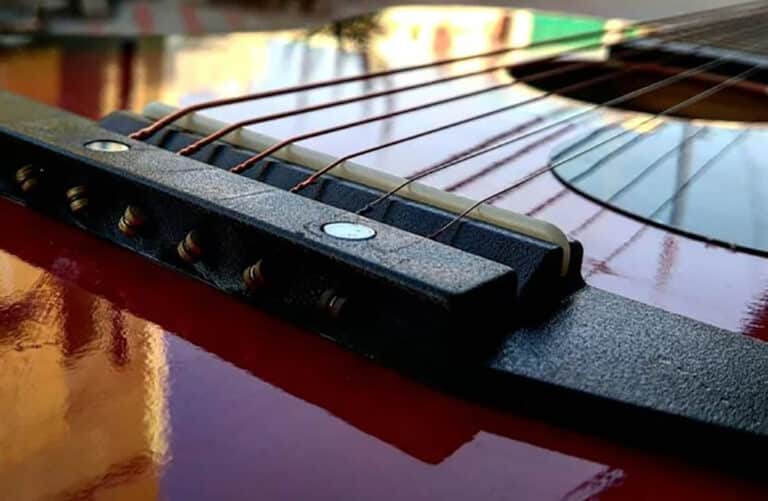
Extra Light Gauge (0.010-0.047)
Extra light gauge strings are the thinnest and easiest to play.
They’re great for beginners or players who prefer a softer touch.
However, they can produce a less robust sound and may break more easily than heavier gauges.
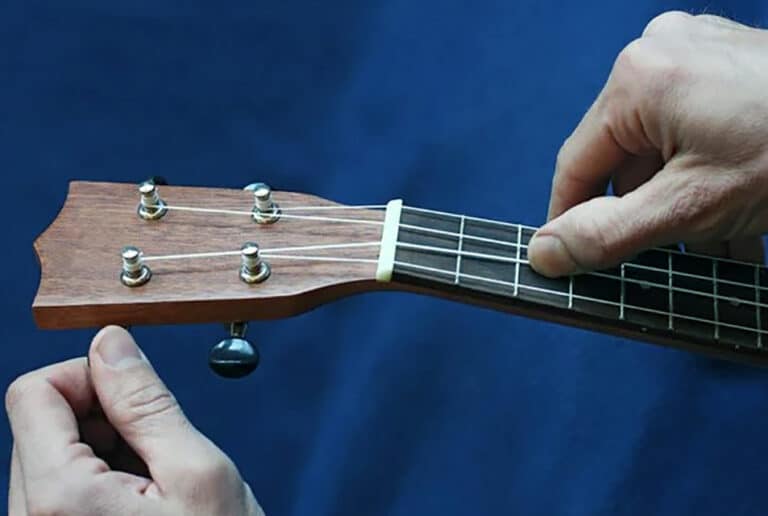
Light Gauge (0.011-0.052)
Light gauge strings are slightly thicker than extra light gauge strings.
They’re still easy to play, but they produce a fuller sound.
They’re good for players who want to balance playability and sound.

Medium Gauge (0.012-0.054)
Medium gauge strings are
Thicker than light gauge strings,
Producing a fuller and richer sound.
However, they require more finger strength and
May be more difficult for beginners.
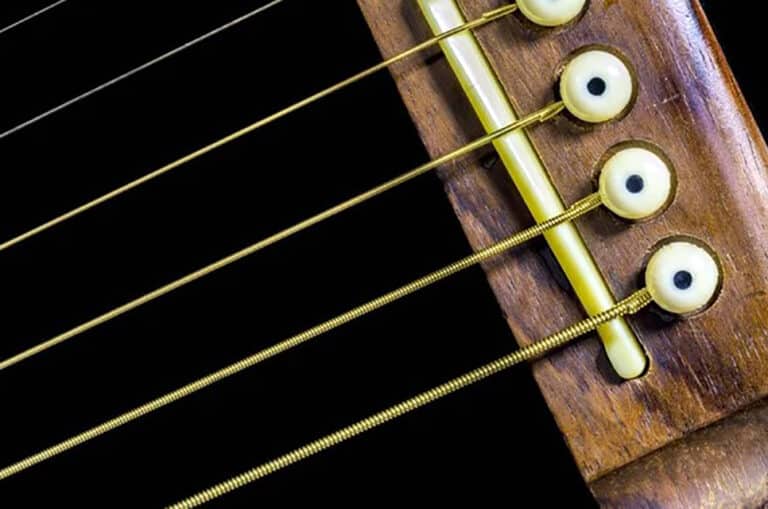
Heavy Gauge (0.013-0.056)
Heavy gauge strings are the thickest and produce the fullest sound.
They are great for players who want a deep, rich tone. However, they require the most finger strength and may be too difficult for beginners.
When choosing a gauge for your guitar strings, consider your playing style, skill level, and the type of music you play.
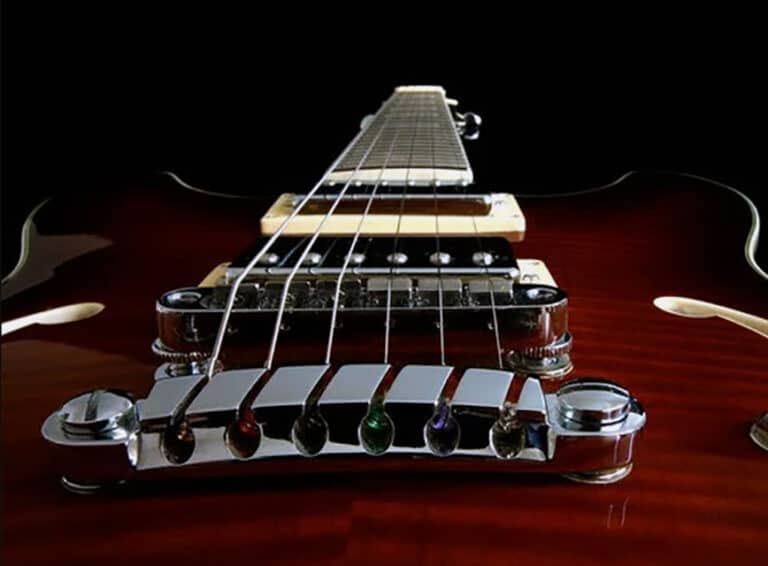
Sound Differences Between Light and Heavy Guitar Strings
Light Gauge Strings
Light gauge strings are generally quieter and looser than heavy gauge strings. They have less mass, so they vibrate more easily, resulting in a brighter, more treble sound. This makes them ideal for playing lead guitar or fingerpicking, as they allow for more nuance and subtlety in your playing.
However, light gauge strings can also be less robust than heavy gauge strings, making them more prone to breaking. They can also go out of tune more easily, especially if you play aggressively or frequently bend the strings.
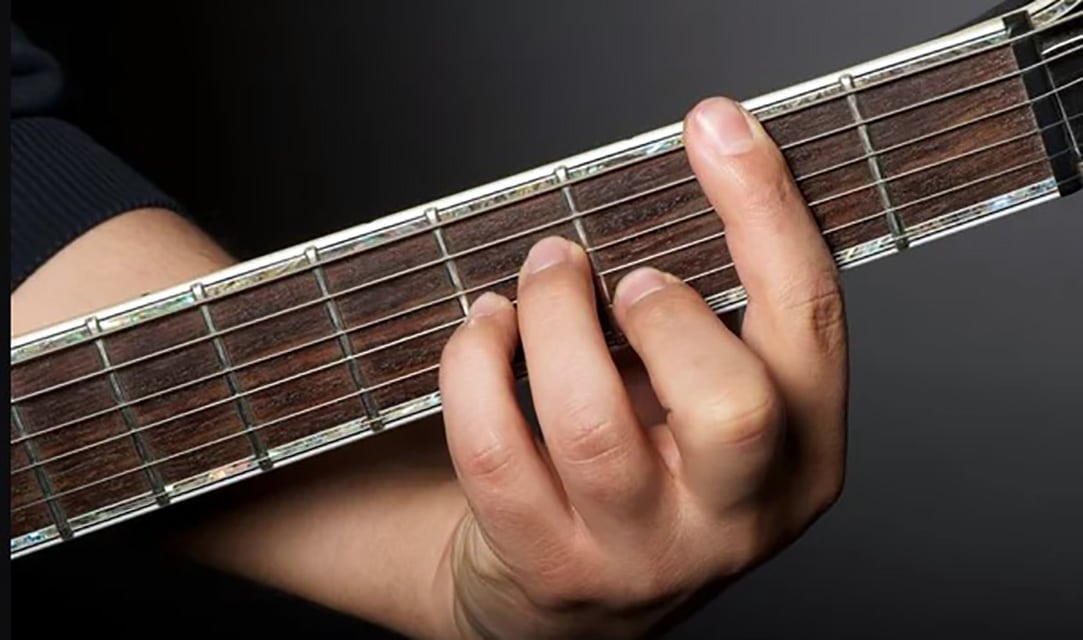
Heavy Gauge Strings
Heavy gauge strings, conversely, are generally louder and more attuned to bass tones.
They have more mass, so they vibrate less easily, resulting in a deeper, fuller sound. This makes them ideal for playing rhythm guitar, heavy rock, or metal music. Heavy gauge strings are also more robust than light gauge strings, making them less likely to break.
They are also less likely to go out of tune, even if you play aggressively or frequently bend the strings.
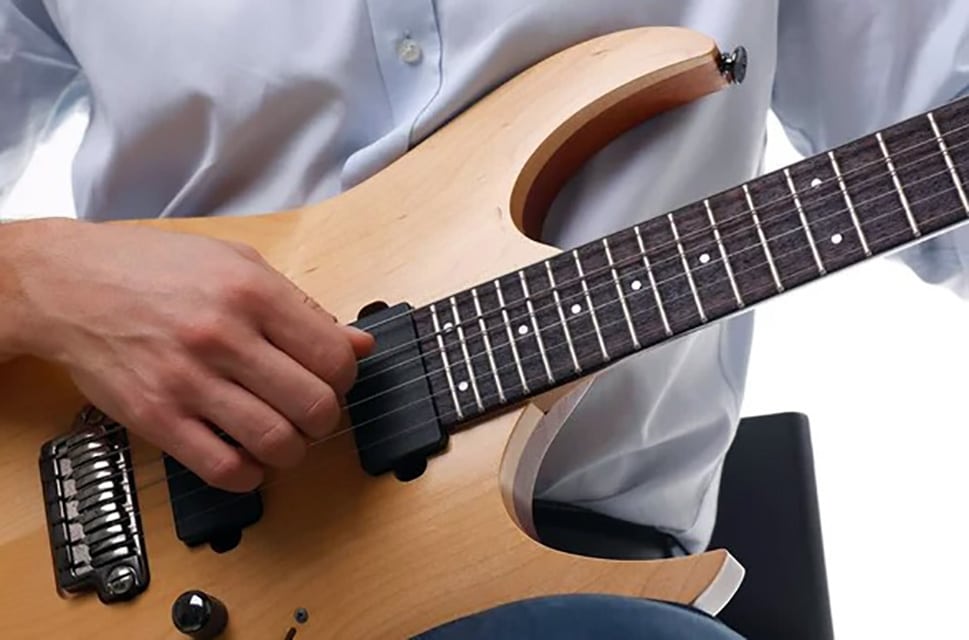
Which One Should You Choose?
However, heavy gauge strings may be more suitable if you prefer deeper, brassier tones and want to play rhythm guitar or heavy rock or metal music. It’s worth noting that medium gauge strings are also available, which balance the brightness of light gauge strings and the depth of heavy gauge strings.

Ultimately, the best way to determine which gauge is right for you is to try a few different options and see which one feels and sounds the best.
Light Guitar Strings
Light gauge guitar strings might be the way to go if you’re a beginner or just looking for a more comfortable playing experience. Here are some advantages and disadvantages of using light gauge strings.
Advantages of Using Light Guitar Strings
Easier to play: Light strings require less finger pressure to fret and strum, making them ideal for beginners or those with weaker hands.
Less strain on the guitar: Light strings put less tension on the guitar’s neck and body, reducing the risk of damage or warping.
Brighter tone: Light strings produce a brighter, more treble-heavy tone that can be ideal for certain genres like folk or pop.
Disadvantages of Using Light Guitar Strings
Quieter volume: Light strings produce less volume than heavier strings, which can be a disadvantage if you’re playing in a band or need to project your sound.
Less sustain: Because they’re thinner, light strings vibrate for a shorter period of time, resulting in less sustain.
More prone to breakage: Light strings are more delicate than heavier strings and are more likely to break, especially if you play aggressively or use a lot of bending and vibrato.
Recommended Light Guitar Strings
Ernie Ball Extra Slinky
These strings offer a smooth and comfortable playing experience, making them perfect for those who prefer a light touch and fast playing style.
The nickel-plated steel construction provides a bright and balanced tone, allowing your guitar’s natural sound to shine through with clarity and precision.
Whether a beginner or a seasoned pro, these strings will deliver exceptional performance and lasting durability, ensuring your playing remains consistently excellent.
Ernie Ball Extra Slinky 2225 Nickel Guitar Strings 8-38
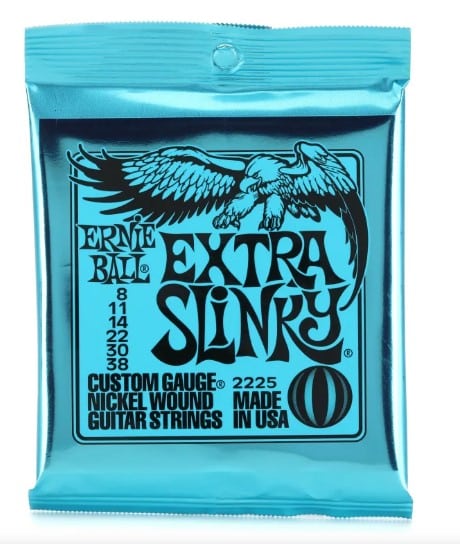
FEATURES: -Made of nickel-plated steel wire
wrapped around a tin-plated hex-shaped steel core wire
-Extra light gauge with a string
thickness of .008, .011,
.014, .022, .030, and .038
-Produces a bright and
balanced tone with excellent intonation
- Easy to play and bend
- Offers a clear and crisp sound
- Ideal for genres like rock, pop, and country
- Can be more prone to breaking due to its thin gauge
When you click ‘Check Price’, you’ll see there are loads of great places to buy this item. Our personal favorite is Sweetwater for the US, and Thomann and Gear4Music for the UK & Europe.
They are the largest music retailers, with excellent customer service, competitive prices, really fast shipping, and the longest guarantees.
The professional musician who wrote this article combined many things,
from the product build, manufacturer’s reputation through to feedback
from other users, to create our famous TedScore™.
Acoustic Guitar Strings by Gear4music, Light
These strings are specifically designed to produce a bright and vibrant tone. With a light gauge, they offer a comfortable playing experience, making it easier to execute bends and chords with precision.
Crafted with durability in mind, these strings are built to last, ensuring they can withstand intense playing sessions without losing their tone or breaking easily.
Acoustic Guitar Strings 85/15, Light

FEATURES: -Made of high-quality phosphor bronze wire wrapped around a hexagonal steel core
-Light gauge with a string thickness of .012, .016, .024, .032, .042, and .053
-
-Offers a warm and balanced tone with excellent sustain and projection
- Ideal for various playing styles and genres, including fingerstyle, strumming, and flatpicking
- Durable and long-lasting, thanks to their corrosion-resistant coating
- Affordable for students
- May require a longer break-in period compared to other string sets
When you click ‘Check Price’, you’ll see there are loads of great places to buy this item. Our personal favorite is Sweetwater for the US, and Thomann and Gear4Music for the UK & Europe.
They are the largest music retailers, with excellent customer service, competitive prices, really fast shipping, and the longest guarantees.
The professional musician who wrote this article combined many things,
from the product build, manufacturer’s reputation through to feedback
from other users, to create our famous TedScore™.
D'Addario EXL170 Bass Guitar Strings
These light gauge strings, with sizes ranging from 45-100, offer comfortable and easy playability perfect for beginners and experienced musicians. Designed with a long scale length in mind, these strings provide a well-balanced tone and excellent intonation throughout the fretboard.
The EXL170 strings are known for their durability, ensuring long-lasting performance and reduced breakage, even during intense playing sessions.
D'Addario EXL170 Bass Guitar Strings, Light 45-100, Long Scale
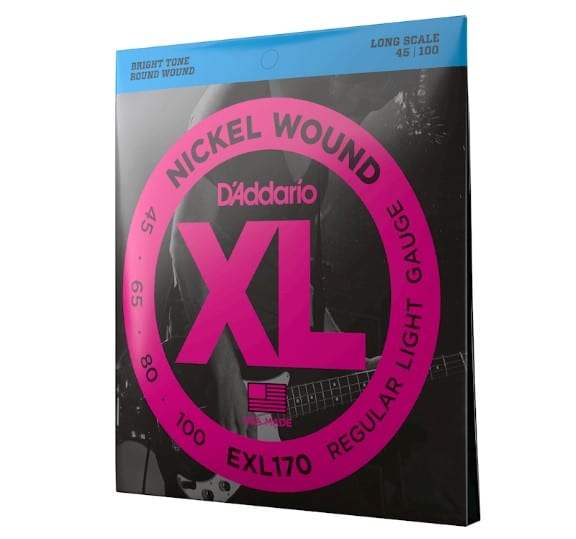
FEATURES:-
-Incredible intonation provided by precision wound XL strings
-Distinctive bright tone resulting from nickel-plated steel material
- Versatile enough to accommodate a range of genres and playing styles
- Fits a variety of basses due to the 36.25” scale length
- May be more prone to breaking due to its lighter gauge
When you click ‘Check Price’, you’ll see there are loads of great places to buy this item. Our personal favorite is Sweetwater for the US, and Thomann and Gear4Music for the UK & Europe.
They are the largest music retailers, with excellent customer service, competitive prices, really fast shipping, and the longest guarantees.
The professional musician who wrote this article combined many things,
from the product build, manufacturer’s reputation through to feedback
from other users, to create our famous TedScore™.
Heavy Guitar Strings
Advantages of Using Heavy Guitar Strings
1. Heavy gauge strings may be the way to go if you want a louder and fuller sound. These thicker strings produce a more bass-heavy tone that can make your guitar sound stand out.
2. Heavy strings are more durable and less likely to break, making them ideal for players who frequently play gigs or practice for long hours.
3. They stay in tune for longer periods. This means that you won’t have to tune your guitar as often, which can save you time and hassle.
Disadvantages of Using Heavy Guitar Strings
Can be more difficult to play due to the extra tension on the strings. The extra tension on the strings can make it harder to press down on the frets, which can be especially challenging for beginners or players with weaker hands.
2. Heavy strings can cause wear and tear on your guitar’s neck and frets. This can lead to costly repairs, so weighing the pros and cons before switching to heavy gauge strings is important.
Recommended Heavy Guitar Strings
Fender Super 250H NPS Ball End Guitar Strings
The Fender Super 250H NPS Ball End Guitar Strings are a fantastic choice for guitar players looking for superb tone and durability. With their nickel-plated steel construction and ball end design, these strings offer a smooth feel and excellent response, making playing a breeze.
The NPS (nickel-plated steel) coating ensures a bright and clear sound with enhanced sustain while also providing resistance to corrosion and wear. Whether you’re strumming chords or shredding solos, these strings deliver consistent performance and stay in tune for extended periods.
Fender Super 250H NPS Ball End Guitar Strings, 12-52
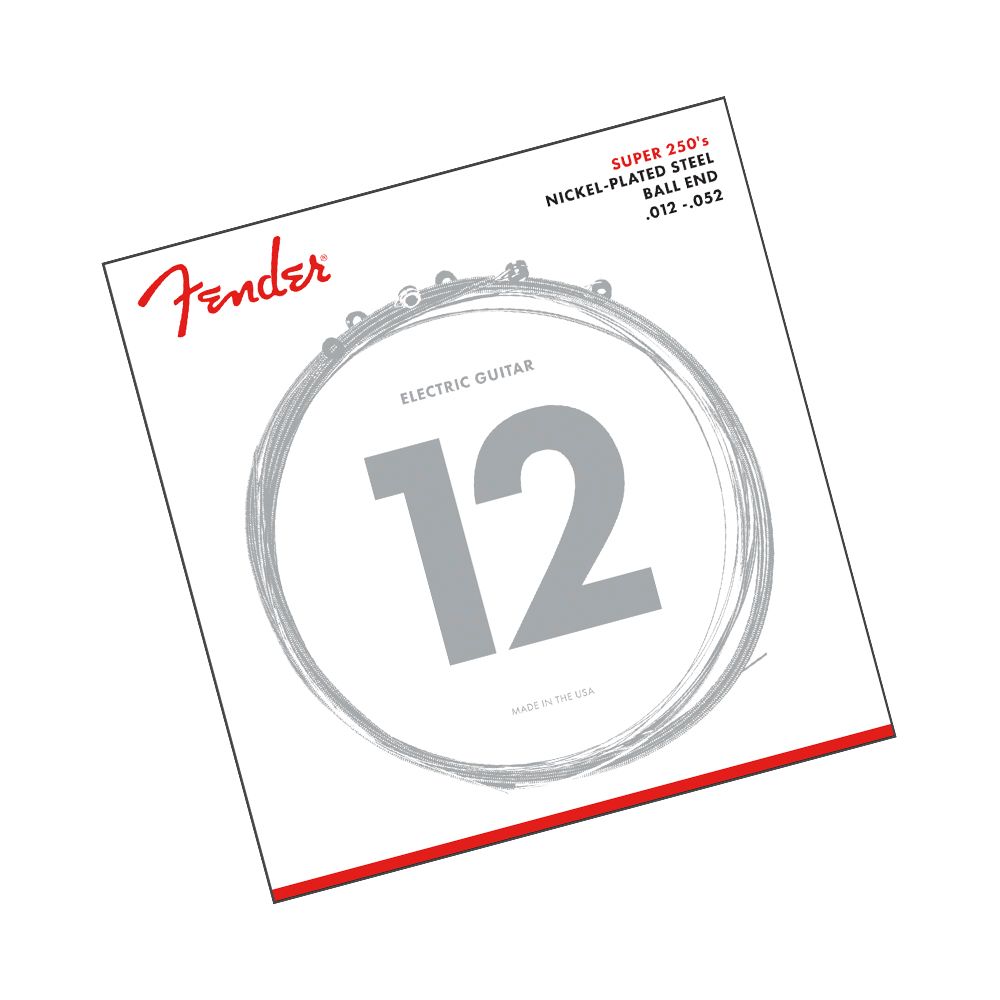
FEATURES:
-Made of high-quality nickel-plated
steel wire wrapped around a hexagonal steel core
-Medium gauge with a string thickness of
.012, .016, .024, .032, .042, and .052
-Offers a bright and balanced
tone with excellent sustain and projection
- Provides high output with a deliciously dynamic sound that'll liven up your playing
- Durable and long-lasting, thanks to their corrosion-resistant coating
- Can be more expensive compared to other string sets
When you click ‘Check Price’, you’ll see there are loads of great places to buy this item. Our personal favorite is Sweetwater for the US, and Thomann and Gear4Music for the UK & Europe.
They are the largest music retailers, with excellent customer service, competitive prices, really fast shipping, and the longest guarantees.
The professional musician who wrote this article combined many things,
from the product build, manufacturer’s reputation through to feedback
from other users, to create our famous TedScore™.
D'Addario EJ27H Classic Nylon Silverplated Wound Guitar Strings
The D’Addario EJ27H Classic Nylon Silverplated Wound Guitar Strings are the perfect choice for classical guitarists looking for a high-quality and reliable set of strings.
These strings are designed with precision and craftsmanship, ensuring excellent performance and tone. The nylon core of these strings provides a comfortable playing experience, making it easy to navigate through complex fingerings and chords.
D'Addario EJ27H Classic Nylon Silverplated Wound Guitar Strings

FEATURES:
-Made of high-quality nylon trebles and silver-plated copper-wound basses
-High-tension gauge with a string thickness of .0285, .0327, .0410, .030, .036, and .044
-Offers a warm and mellow tone with excellent intonation and projection
- Ideal for classical and flamenco guitarists who want a traditional and authentic sound
- Durable and long-lasting, thanks to their corrosion-resistant coating
- Can be more difficult to play due to the high-tension gauge
When you click ‘Check Price’, you’ll see there are loads of great places to buy this item. Our personal favorite is Sweetwater for the US, and Thomann and Gear4Music for the UK & Europe.
They are the largest music retailers, with excellent customer service, competitive prices, really fast shipping, and the longest guarantees.
The professional musician who wrote this article combined many things,
from the product build, manufacturer’s reputation through to feedback
from other users, to create our famous TedScore™.
Rotosound RB50 Nickel Bass Guitar Strings, 50-110
The D’Addario EJ27H Classic Nylon Silverplated Wound Guitar Strings are the perfect choice for classical guitarists looking for a high-quality and reliable set of strings.
These strings are designed with precision and craftsmanship, ensuring excellent performance and tone. The nylon core of these strings provides a comfortable playing experience, making it easy to navigate through complex fingerings and chords.
x
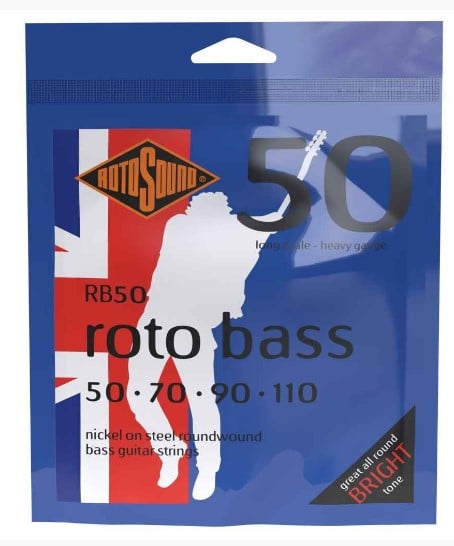
FEATURES:
- Made of high-quality nickel-plated
steel wire wrapped around a hexagonal steel core.
-Medium gauge with a
string thickness of .050, .070, .085, .105, and .110.
-Offers a bright and punchy
tone with excellent sustain and intonation.
- Ideal for rock and metal bassists who want a powerful and aggressive sound.
- Durable and long-lasting, thanks to their corrosion-resistant coating.
- May not be suitable for players who prefer a warmer and more mellow tone
- Can be more expensive compared to other string sets
When you click ‘Check Price’, you’ll see there are loads of great places to buy this item. Our personal favorite is Sweetwater for the US, and Thomann and Gear4Music for the UK & Europe.
They are the largest music retailers, with excellent customer service, competitive prices, really fast shipping, and the longest guarantees.
The professional musician who wrote this article combined many things,
from the product build, manufacturer’s reputation through to feedback
from other users, to create our famous TedScore™.
How to Decide Which Gauge of Guitar Strings to Use
When choosing the right gauge of guitar strings, there are a few factors to consider. Here are the three main things to keep in mind:
Which Gauge of Guitar Strings to Use
Your playing style and technique play a big role in determining the gauge of strings that will work best for you. Lighter gauge strings might be the way to go if you play with a light touch and prefer a more delicate sound.
On the other hand, if you play with a heavy hand and like to dig in, heavier gauge strings will give you the volume and sustain you need.
Your personal sound preferences will also come into play when choosing the right gauge of strings. Lighter gauge strings tend to have a brighter, more treble-heavy tone, while heavier gauge strings have a deeper, more bass-heavy sound.
Consider the type of music you play and the tone you want to achieve, and choose your strings accordingly.
Finally, the type of guitar you have and its setup can also influence the gauge of strings you should use. If you have a smaller or lighter guitar, lighter gauge strings will help prevent the guitar from sounding too thin or weak.
Conversely, if you have a larger or heavier guitar, heavier gauge strings will help bring out the full, rich tones of the instrument.
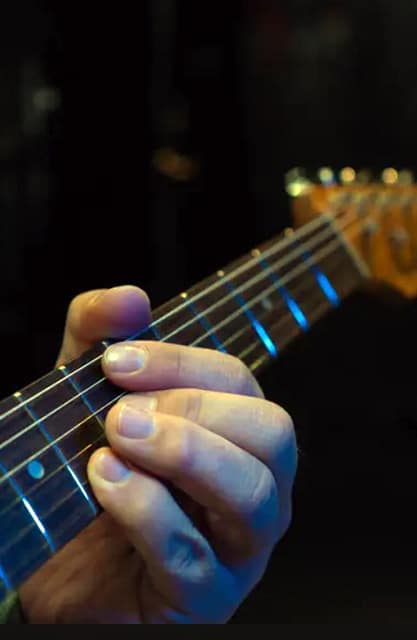
Light Vs Heavy Guitar Strings
Final Thoughts
Choosing between light and heavy guitar strings depends on your playing style, desired sound, and preference.
Light and medium strings are easier to play and produce a bright sound, while heavy strings require more finger strength and produce a fuller tone.
It’s important to find the right balance between playability and tone and to experiment with different gauges until you find the perfect fit. Remember to consider your guitar type, which can affect your string choice.
Ultimately, the most important thing is to choose a string that feels comfortable to play and produces the sound you want.
So go ahead and experiment, have fun, and find your perfect string gauge!
And if you want a wider choice of strings, take a look at my new article: 20 Best Guitar Strings.
FAQ's
This is subjective, as what sounds better to one person may not sound as good to another. However, heavier guitar strings can produce a fuller and richer tone, but they may also be more difficult to play and require more finger strength.
Lighter and thinner strings are generally easier to play as they require less finger strength and effort to push down. However, they may not produce as full or rich tones as heavier strings.
Heavier strings may stay in tune longer than lighter strings due to their increased tension and stability. However, factors such as the quality of the guitar’s tuning pegs and the player’s technique can also affect how well the guitar stays in tune.
Yes, guitar string gauge matters as it can significantly affect the playability and tone of the guitar. The gauge of the strings can impact the tension, feel, and sound of the guitar, and different string gauges may be more suitable for different playing styles and genres of music.












While the article makes some excellent points about the tonal variation between light and heavy strings, it somewhat underrepresents the significant impact that string gauge can have on classical guitars. In the classical realm, nuances in string composition and tension can dramatically alter both playability and the voice of the instrument. Particularly for pieces demanding a wide dynamic range, medium tension strings might offer a compromise, balancing richness of tone with ease of playability. It’d be insightful to see a more in-depth analysis on this.
I’ve been reading up on guitar strings and setups as I’m fairly new to this. When you talk about the sound differences between light and heavy strings, does one type generally suit beginners better than the other? I wonder if starting with light strings might make learning easier.
just slapped some heavy strings on my electric and the difference is insane. love how it beefs up the sound 🤘
Hey Hugh Richardson, I’ve been playing my acoustic guitar for a while, mostly fingerstyle, and I’m thinking about switching from light to medium gauge strings to see if it enhances the sound depth. But I’m a bit worried about the increased tension affecting my playing comfort. Do you think the trade-off in sound quality is worth the potential decrease in playability? I’d appreciate your input on this before I make the switch.
MaggieS, I made the switch to medium gauge strings last year for my semi-hollow and yes, there’s a bit of tension difference but the sound payoff is totally worth it. Give it a few weeks, your fingers will adapt!